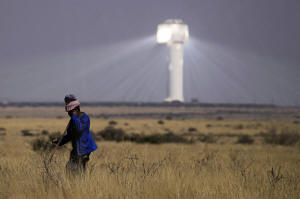Africa's solar energy potential makes for a bright future for renewable
power
[September 08, 2025] By
MOGOMOTSI MAGOME
UPINGTON, South Africa (AP) — Deep in South Africa’s Northern Cape
province, south of the Kalahari Desert, a beaming light towers above
dozens of solar mirror panels.
The mirrors tilt to varying degrees throughout the day, tracking the
sunrays and projecting them onto a tower. The tower houses a receiver
that absorbs intense heat, boils water and produces high-pressure steam.
This is then converted into 50 megawatts of electricity — enough to
power over 40,000 households for 24 hours.
The KHI Solar One project is one of many looking to add renewable energy
to South Africa's power grid, which is heavily reliant on coal-fired
power stations.
However, as hundreds of delegates prepare to gather in the Ethiopian
capital of Addis Ababa for the Africa Climate Summit this week, it's
clear that many more such projects are needed to bring electricity to
millions of people on the continent who need it and to fight the impacts
of climate change.
Africa's energy needs
According to the International Energy Agency, about 600 million people
on a continent of some 1.5 billion live without electricity, leaving
children without lights to study at night and homes without power for
appliances.
The World Bank estimates that Central and West Africa have some of the
world’s lowest electrification rates. In West Africa, where 220 million
people have no electricity, the electrification rate is as low as 8%.

The lack of electricity also limits the continent's access to quality
health care, education and economic growth brought about by a sufficient
and uninterrupted power supply.
The continent's embracing of renewable energy has been slow when
compared to more developed economies like China, European countries and
the U.S., which account for 80% of renewable power capacity installed
worldwide.
Only 1.5% of installed renewable power capacity is in Africa.
Renewable energy potential in Africa
According to a report by the United Nations released in July, Africa has
60% of the world's best solar resources with the continent's deserts and
warm climate creating massive potential for solar projects.
[to top of second column] |

A shepherd watches livestock near Khi Solar One, a solar thermal
plant that converts the sun's light energy into electricity, outside
Upington, South Africa, in the Northern Cape province, Friday, Aug.
29, 2025. (AP Photo/Themba Hadebe)
 Despite this, Africa received just
2% of global clean energy investments in 2024.
At a climate summit in January this year, African leaders committed
to bringing renewable energy capacity in Africa to 300 gigawatts by
2030. That amount of power equals the output of about 114 large
power stations — enough to power a large city or a small country.
Meanwhile, the International Renewable Energy Agency projects that
90% of Africa's power could be generated from renewables including
solar by 2050.
This includes other renewable energy sources besides solar, with
countries like South Africa opting for an energy mix that includes
hydropower and wind energy.
China's rising solar exports to Africa
Some recent analysis of Chinese export data has shown that exports
of solar panels to Africa have increased significantly over the last
12 months.
A report by energy think tank Ember notes that imports from China
rose 60% in the last year to 15,032 megawatts, with 20 African
countries setting a record for imports of solar panels in a 12-month
period.
While the surge in solar panels had previously been buoyed by
imports by South Africa, which went through years of power blackouts
due to a lengthy electricity crisis, imports of solar panels from
outside of South Africa tripled in the last 12 months.
Increasingly, independent energy companies are seeing Africa as a
market for solar products as they look to fulfill the continent's
energy needs.
All contents © copyright 2025 Associated Press. All rights reserved
 |